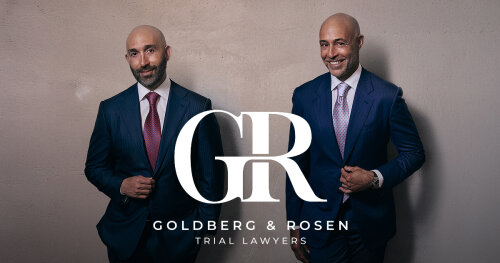Best Auto Dealer Fraud Lawyers in Florida
Share your needs with us, get contacted by law firms.
Free. Takes 2 min.
Or refine your search by selecting a city:
List of the best lawyers in Florida, United States
About Auto Dealer Fraud Law in Florida, United States
Auto dealer fraud in Florida refers to deceptive or dishonest practices by auto dealerships during the sale or leasing of vehicles. These unlawful tactics can involve misrepresenting a vehicle’s condition, concealed damage, rolling back odometers, misrepresenting the terms of a sale, or failing to disclose crucial information about a car's history. The goals of Florida’s auto dealer fraud laws are to protect consumers from dishonest dealers, promote transparency, and ensure buyers receive what they are promised. If you purchase or lease a vehicle in Florida and discover that a dealer has not been truthful, you may have legal grounds to seek compensation or cancel the deal.
Why You May Need a Lawyer
Legal assistance is vital when dealing with possible auto dealer fraud for several reasons. Many sales agreements are complex, and dealerships often have legal teams on their side. You might need a lawyer if you experience the following situations:
- Discovering that the car you purchased was previously in an accident that was not disclosed by the dealer.
- Learning that the odometer reading was tampered with to show fewer miles than actually driven.
- Finding hidden fees or charges in your contract that were not explained during the sale.
- Being misled about the vehicle’s condition, warranty status, or features.
- Receiving a different interest rate or loan term than what was promised.
- Realizing the vehicle had major mechanical issues that were hidden or misrepresented.
An experienced attorney can help you gather evidence, interpret contracts, negotiate with dealerships, and file lawsuits if necessary. Having legal representation ensures your rights are protected and increases your chance of a positive outcome.
Local Laws Overview
Auto dealer fraud cases in Florida are primarily regulated under several key statutes and consumer protection laws:
- Florida Deceptive and Unfair Trade Practices Act (FDUTPA): This law prohibits businesses, including auto dealers, from engaging in unfair or deceptive acts or practices. Consumers may sue for damages and attorney fees if the law is violated.
- Florida Motor Vehicle Retail Sales Finance Act: Governs dealership loan practices, disclosure requirements, and retail installment contracts.
- Odometer Fraud Laws: Federal statutes (49 USC § 32701, etc.) and Florida laws require accurate odometer readings to be disclosed; tampering is illegal and punishable by fines or criminal charges.
- Requirements for Disclosure: Dealers must disclose information about previous accidents, salvage or rebuilt titles, and major repairs when selling a vehicle. Non-disclosure may constitute fraud.
- Dealership Licensing and Regulation: The Florida Department of Highway Safety and Motor Vehicles (DHSMV) handles licensing and investigates complaints against dealerships.
These laws collectively create a framework to protect buyers against fraudulent dealership practices. If you believe a dealership has violated these laws, you may have the right to compensation or other remedies.
Frequently Asked Questions
What is auto dealer fraud?
Auto dealer fraud happens when a dealership uses deceptive, misleading, or unfair tactics to sell or lease a vehicle. This can include hiding damage, rolling back odometers, false advertising, or failing to disclose important information about the car.
What are some examples of auto dealer fraud?
Common examples are odometer rollbacks, hiding past accidents or flood damage, selling vehicles with a salvage or rebuilt title without disclosure, adding hidden fees, providing misleading financing information, or false advertising about the car's features.
What legal protections exist for car buyers in Florida?
The Florida Deceptive and Unfair Trade Practices Act, odometer laws, and sales disclosure requirements all protect consumers. Florida’s lemon law may apply in certain cases for new vehicles with persistent defects.
What are my options if I suspect I am a victim of auto dealer fraud?
You may file a complaint with the Florida Department of Highway Safety and Motor Vehicles, the Florida Attorney General’s office, or consult with a private attorney to pursue compensation, contract cancellation, or other remedies.
Can I sue a car dealership for fraud in Florida?
Yes, victims of auto dealer fraud can take legal action against a dealership. Lawsuits can seek cancellation of the sale, a return of your money, or additional damages depending on the case.
What kind of evidence is important in an auto dealer fraud case?
Save all paperwork from the transaction, including the bill of sale, warranty documents, vehicle history reports, repair records, communications with the dealer, and photos or expert inspections that confirm deception or damage.
Is there a time limit to file a claim for auto dealer fraud in Florida?
Yes. The statute of limitations varies depending on the claim, but you generally need to start your action within four years from when you discovered or should have discovered the fraud.
Does auto dealer fraud apply to both new and used vehicles?
Auto dealer fraud laws cover both new and used vehicles. Disclosure requirements and protections under state law apply to all types of vehicle sales by dealerships.
Can the dealership cancel my contract if I report fraud?
If you lawfully report deception, the dealership should not retaliate against you. Any attempt to cancel your contract as retaliation may itself be unlawful, and it strengthens your legal case.
How can a lawyer help if I have been a victim of auto dealer fraud?
A lawyer can analyze your case, gather evidence, negotiate with the dealership for a fair resolution, and represent you in legal proceedings if necessary. They can maximize your chances of compensation and protect you from further unfair practices.
Additional Resources
If you are seeking more information or wish to file a complaint regarding auto dealer fraud in Florida, the following resources may be helpful:
- Florida Department of Highway Safety and Motor Vehicles (DHSMV): Handles complaints about licensed dealerships and enforces dealer regulations.
- Florida Attorney General’s Office - Consumer Protection Division: Investigates and prosecutes deceptive trade practices concerning auto sales.
- National Highway Traffic Safety Administration (NHTSA): Offers consumer guides and information about odometer fraud.
- Better Business Bureau (BBB): Provides dealership ratings and complaint procedures.
- Local Legal Aid Organizations: Offer free or low-cost legal assistance to eligible individuals facing auto dealer fraud.
Next Steps
If you believe that you are a victim of auto dealer fraud in Florida, it is important to act promptly:
- Gather all your documents related to the purchase or lease, including contracts, advertisements, and communication with the dealer.
- Have your vehicle inspected by a qualified mechanic if there are physical defects or undisclosed issues.
- Contact the dealership in writing to attempt to resolve the issue, keeping records of all interactions.
- If the matter is not resolved, file a formal complaint with the Florida DHSMV or the Attorney General's Consumer Protection Division.
- Consult with an attorney who focuses on auto dealer fraud or consumer law. Many attorneys offer free consultations and can advise you on the strength of your case.
Taking swift action and seeking professional guidance increases your chances of a successful resolution and may prevent other consumers from falling victim to the same dealership practices.
Lawzana helps you find the best lawyers and law firms in Florida through a curated and pre-screened list of qualified legal professionals. Our platform offers rankings and detailed profiles of attorneys and law firms, allowing you to compare based on practice areas, including Auto Dealer Fraud, experience, and client feedback.
Each profile includes a description of the firm's areas of practice, client reviews, team members and partners, year of establishment, spoken languages, office locations, contact information, social media presence, and any published articles or resources. Most firms on our platform speak English and are experienced in both local and international legal matters.
Get a quote from top-rated law firms in Florida, United States — quickly, securely, and without unnecessary hassle.
Disclaimer:
The information provided on this page is for general informational purposes only and does not constitute legal advice. While we strive to ensure the accuracy and relevance of the content, legal information may change over time, and interpretations of the law can vary. You should always consult with a qualified legal professional for advice specific to your situation.
We disclaim all liability for actions taken or not taken based on the content of this page. If you believe any information is incorrect or outdated, please contact us, and we will review and update it where appropriate.
Browse auto dealer fraud law firms by city in Florida
Refine your search by selecting a city.












